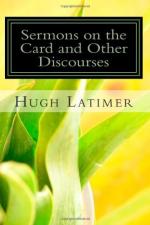of herself, and how greatly she had offended God; whereby
she conceived in Christ great love, and so came near
unto him, and washed his feet with bitter tears, and
shed upon his head precious ointment, thinking that
by him she should be delivered from her sins.
This great and proud Pharisee, seeing that Christ
did accept her oblation in the best part, had great
indignation against this woman, and said to himself,
“If this man Christ were a holy prophet, as he
is taken for, he would not suffer this sinner to come
so nigh him.” Christ, understanding the
naughty mind of this Pharisee, said unto him, “Simon,
I have somewhat to say unto thee.” “Say
what you please,” quod the Pharisee. Then
said Christ, “I pray thee, tell me this:
If there be a man to whom is owing twenty pound by
one, and forty by another, this man to whom this money
is owing, perceiving these two men be not able to
pay him, he forgiveth them both: which of these
two debtors ought to love this man most?” The
Pharisee said, “That man ought to love him best,
that had most forgiven him.” “Likewise,”
said Christ, “it is by this woman: she hath
loved me most, therefore most is forgiven her; she
hath known her sins most, whereby she hath most loved
me. And thou hast least loved me, because thou
hast least known thy sins: therefore, because
thou hast least known thine offences, thou art least
forgiven.” So this proud Pharisee had an
answer to delay his pride. And think you not,
but that there be amongst us a great number of these
proud Pharisees, which think themselves worthy to
bid Christ to dinner; which will perk, and presume
to sit by Christ in the church, and have a disdain
of this poor woman Magdalene, their poor neighbour,
with a high, disdainous, and solemn countenance?
And being always desirous to climb highest in the
church, reckoning themselves more worthy to sit there
than another, I fear me poor Magdalene under the board,
and in the belfry, hath more forgiven of Christ than
they have: for it is like that those Pharisees
do less know themselves and their offences, whereby
they less love God, and so they be less forgiven.
I would to God we would follow this example, and be
like unto Magdalene. I doubt not but we be all
Magdalenes in falling into sin and in offending:
but we be not again Magdalenes in knowing ourselves,
and in rising from sin. If we be the true Magdalenes,
we should be as willing to forsake our sin and rise
from sin, as we were willing to commit sin and to
continue in it; and we then should know ourselves best,
and make more perfect answer than ever we did unto
this question, “Who art thou?” to the
which we might answer, that we be true christian men
and women: and then, I say, you should understand,
and know how you ought to play at this card, “Thou
shalt not kill,” without any interruption of
your deadly enemies the Turks; and so triumph at the
last, by winning everlasting life in glory.
Amen.
ANOTHER SERMON OF M. LATIMER, CONCERNING THE SAME MATTER.




